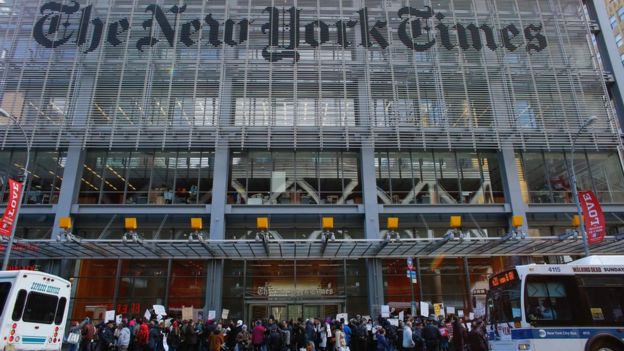New York Times tells Trump: Don't call reporters enemies of the people

AG Sulzberger made the details of their off-the-record meeting public after Mr Trump tweeted about it.
In his initial tweet, the president said it had been a "very good" meeting.
But he later accused media of putting people's lives at risk through their reporting.
His first tweet read: "Spent much time talking about the vast amounts of Fake News being put out by the media & how that Fake News has morphed into phrase, 'Enemy of the People.' Sad!"
He did not refer to his own repeated use of the phrase.
The New York Times then released its statement, saying it had decided to "respond to the president's characterisation of their conversation".
- Why Trump attacks the media
- How Trump 'enemies' remark echoes tyrants
- Reality Check: Are journalists increasingly under attack?
Mr Sulzberger said he had accepted the meeting with Mr Trump to raise concerns about the president's "deeply troubling anti-press rhetoric".
Report
He said he told Mr Trump that the phrase "fake news" was "untrue and harmful" but said he was "far more concerned about his labelling journalists 'the enemy of the people'".
"I warned that this inflammatory language is contributing to a rise in threats against journalists and will lead to violence," he said.

Mr Sulzberger said he had told the president that this was particularly true in other countries, where he said Mr Trump's rhetoric was being used by some regimes to crack down on journalists.
"I warned that it was putting lives at risk, that it was undermining the democratic ideals of our nation, and that it was eroding one of our country's greatest exports: a commitment to free speech and a free press," he said.
 Image copyrightAFP
Image copyrightAFP
The New York Times publisher said he was not asking Mr Trump not to criticise his newspaper if he was unhappy with its coverage but asking him to "reconsider his broader attacks on journalism".
After Mr Sulzberger's statement was made public, Mr Trump appeared to respond, tweeting that media reporting on the "internal deliberations" of government "truly puts the lives of many, not just journalists, at risk".
Report
He said the media was being "driven insane by their Trump Derangement Syndrome" and accused them of writing "bad stories even on very positive achievements".

In the UK, watch Reporting Trump's First Year, following the inner workings of The New York Times on BBC iPlayer.

A new kind of normal
By Anthony Zurcher, BBC North America reporter
The first time Donald Trump called the media "the enemy of the people", it elicited outrage. Arizona Republican Senator Jeff Flake called it an example of an "unprecedented" White House assault on the free press.
The second, third and fourth times Mr Trump used the phrase, it barely merited a shrug. Such is the unique talent of this president - to take an action or opinion that once seemed outrageous and turn it into a new kind of normal.
Even when the words don't generate headlines anymore, however, journalists still take note. When a newsroom in Maryland was sprayed with bullets just a few weeks ago, the perils of the profession - even in an established, "safe" Western democracy - were put in stark relief.
Mr Sulzberger tried to drive this point home in his previously secret meeting with Mr Trump nine days ago.
The message, however, may not have been received. In his Sunday morning tweet, the president suggests it's the media's fault that he has labelled them "enemies of the American people".
For Mr Trump, this kind of language - if it is a problem - is a problem the media have to fix, not him.

When has Trump called journalists 'enemies of the people'?
In February 2017 he tweeted that the New York Times as well as other outlets NBC, ABC, CNN and CBS were "the enemy of the American people". He reportedly then used the phrase again during a conference the following week.
Report
In June this year he again used the phrase on Twitter during the controversy over the short-lived US policy of separating migrant children from their families at the US border.
Report
Earlier this month he responded to criticism of his meeting with Russian leader Vladimir Putin in the same way.
Report
Report